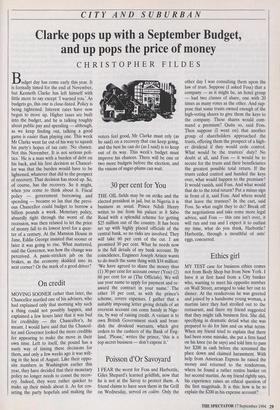CITY AND SUBURBAN
Clarke pops up with a September Budget, and up pops the price of money
CHRISTOPHER FILDES
Budget day has come early this year. It is formally timed for the end of November, but Kenneth Clarke has left himself with little more to say except 'I warned you.' As budgets go, this one is close-fisted. Policy is being tightened. Interest rates have now begun to move up. Higher taxes are built into the budget, and he is talking toughly about public pay and spending — although, as we keep finding out, talking a good game is easier than playing one. This week Mr Clarke went far out of his way to squash his party's hopes of tax cuts: 'No chance. Not this November. It is not serious poli- tics.' He is a man with a burden of debt on his back, and his first decision as Chancel- lor was that the burden would have to be lightened, whatever that did to the prospect of recovery. That decision has stood up. So, of course, has the recovery. So it might, when you come to think about it. Fiscal policy — government borrowing and spending — became so lax that the previ- ous Chancellor could budget to borrow a billion pounds a week. Monetary policy, absurdly tight through the worst of the recession, was then relaxed to let the price of money fail to its lowest level for a quar- ter of a century. At the Mansion House in June, Eddie George insisted that sooner or later it was going to rise. What mattered, said the Governor, was how the change was perceived. A panic-stricken jab on the brakes, as the economy skidded into its next corner? Or the mark of a good driver?


























































 Previous page
Previous page